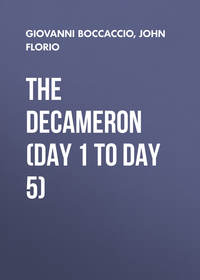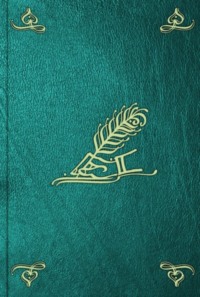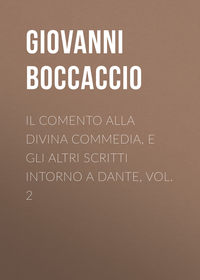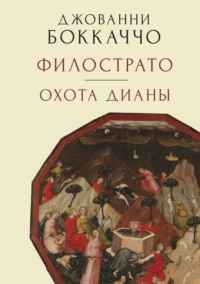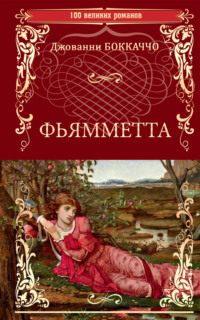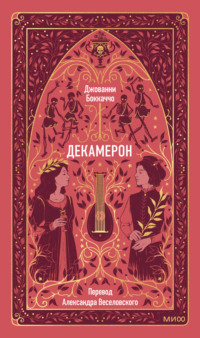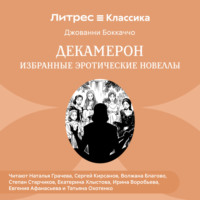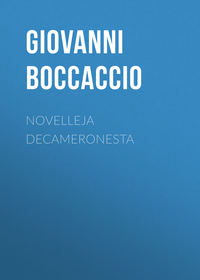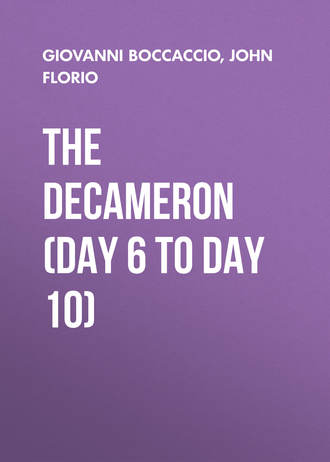 полная версия
полная версияThe Decameron (Day 6 to Day 10)
The Sixth Novell
Serving as an advertisement to unlearned Parents, not to bee over-rash, in censuring on Schollers perfections, through any badde or unbeseeming perswasionsThe Ladies smiled very heartily, at the ready answer of Giotto; untill the Queene charged Madam Fiammetta, that shee should next succeed in order: whereupon, thus she began. The verie greatest infelicity that can happen to a man, and most insupportable of all other, is Ignorance; a word (I say) which hath bin so generall, as under it is comprehended all imperfections whatsoever. Yet notwithstanding, whosoever can cull (graine by graine) the defects incident to humane race; will and must confesse, that wee are not all borne to knowledge: but onely such, whom the heavens illuminating by their bright radiance (wherein consisteth the sourse and well-spring of all science) by little & little, do bestow the influence of their bounty, on such and so manie as they please, who are to expresse themselves the more thankfull for such a blessing. And although this grace doth lessen the misfortune of many, which were over-mighty to bee in all; yet some there are, who by sawcie presuming on themselves, doe bewray their ignorance by theyr owne speeches; setting such behaviour on each matter, and soothing every thing with such gravity, even as if they would make comparison: or (to speake more properly) durst encounter in the Listes with great Salomon or Socrates. But let us leave them, and come to the matter of our purposed Novell.
In a certaine Village of Piccardie, there lived a Priest or Vicar, who beeing meerely an ignorant blocke, had yet such a peremptorie presuming spirite: as, though it was sufficiently discerned, yet hee beguiled many thereby, untill at last he deceyved himselfe, and with due chastisement to his folly.
A plaine Husbandman dwelling in the same Village, possessed of much Land and Living, but verie grosse and dull in understanding; by the entreaty of divers his Friends and Well-willers, some-thing more intelligable then himselfe: became incited, or rather provoked, to send a Sonne of his to the University of Paris, to study there as was fitting for a Scholler. To the end (quoth they) that having but this Son onely, and Fortunes blessings abounding in store for him: hee might like wise have the riches of the minde, which are those true treasures indeede, that Aristippus giveth us advice to be furnished withall.
His Friends perswasions having prevailed, and hee continued at Paris for the space of three yeares: what with the documents he had attayned to, before his going thither, and by meanes of a happie memory in the time of his being there, wherewith no young man was more singularly endued (in so short a while) he attained and performed the greater part of his Studies.
Now, as oftentimes it commeth to passe, the love of a Father (surmounting all other affections in man) made the olde Farmer desirous to see his Sonne: which caused his sending for him with all convenient speede, and obedience urged his as forward willingnesse thereto. The good olde man, not a little joyfull to see him in so good condition and health, and encreased so much in stature since his parting thence: familiarly told him, that he earnestly desired to know, if his minde and body had attained to a competent and equall growth, which within three or foure dayes he would put in practise.
No other helpe had he silly simple man, but Master Vicar must bee the questioner and poser of his son: wherein the Priest was very unwilling to meddle, for feare of discovering his owne ignorance, which passed under better opinion then he deserved. But the Farmer beeing importunate, and the Vicar many wayes beholding to him, durst not returne deniall, but undertooke it very formally, as if he had bene an able man indeede.
But see how Fooles are borne to be fortunate, and where they least hope, there they find the best successe; the simplicitie of the Father, must be the meanes for abusing his Schollerly Son, and a skreene to stand betweene the Priest and his ignorance. Earnest is the olde man to know, what and how farre his Sonne had profited at Schoole, and by what note he might best take understanding of his answeres: which jumping fit with the Vicars vanity, and a warrantable cloake to cover his knavery; he appoints him but one word onely, namely Nescio, wherewith if he answered to any of his demands, it was an evident token, that hee understood nothing. As thus they were walking and conferring in the Church, the Farmer very carefull to remember the word Nescio: it came to passe upon a sodaine, that the young man entred into them, to the great contentment of his Father, who prayed Master Vicar, to make approbation of his Sonne, whether he were learned, or no, and how hee had benefited at the University?
After the time of the daies salutations had past betweene them, the Vicar being subtle and crafty, as they walked along by one of the tombs in the Church; pointing with his finger to the Tombe, the Priest uttered these words to the Scholler.
Quis hic est sepultus?
The young Scholler (by reason it was erected since his departure, and finding no inscription whereby to informe him) answered, as well hee might, Nescio. Immediately the Father, keeping the word perfectly in his memorie, grewe verie angerly passionate; and, desiring to heare no more demaunds: gave him three or foure boxes on the eares; with many harsh and injurious speeches, tearming him an Asse and Villaine, and that he had not learned any thing. His Sonne was pacient, and returned no answer, but plainly perceived, that this was a tricke intended against him, by the malicious treachery of the Priest, on whom (in time) he might be revenged.
Within a short while after, the Suffragane of those parts (under whom the Priest was but a Deputy, holding the benefice of him, with no great charge to his conscience) being abroad in his visitation, sent word to the Vicar, that he intended to preach there on the next Sunday, and hee to prepare in a readinesse, Bonum & Commodum, because hee would have nothing else to his dinner. Heereat Master Vicar was greatly amazed, because he had never heard such words before, neither could hee finde them in all his Breviarie. Hereupon, he went to the young scholler, whom he had so lately before abused, and crying him mercy, with many impudent and shallow excuses, desired him to reveale the meaning of those words, and what he should understand by Bonum & Commodum.
The Scholler (with a sober and modest countenance) made answere; That he had bin over-much abused, which (neverthelesse) he tooke not so impaciently, but hee had already both forgot and forgiven it, with promise of comfort in this his extraordinary distraction, and greefe of minde. When he had perused the Suffraganes Letter, well observing the blushlesse ignorance of the Priest: seeming (by outward appearance) to take it strangely, he cryed out alowd, saying; In the name of Vertue, what may be this mans meaning? How? (quoth the Priest) What manner of demand do you make? Alas, replyed the Scholler, you have but one poore Asse, which I know you love deerely, and yet you must stew his genitories very daintily, for your Patron will have no other meat to his dinner. The genitories of mine Asse, answered the Priest? Passion of me, who then shall carrie my Corne to the Mill? There is no remedie, sayde the Scholler, for he hath so set it downe for an absolute resolution.
After that the Priest had considered thereon a while by himselfe, remembring the yearely revennewes, which clearely hee put up into his purse, to be ten times of farre greater worth then his Asse: he concluded to have him gelded, what danger soever should ensue thereon, preparing them in readinesse against his comming. So soone as the Suffragan was there arrived, heavily hee complained to him for his Asse: which kinde of Language he not understanding, knew not what he meant, nor how he should answer. But beeing (by the Scholler) acquainted with the whole History, he laughed heartily at the Priests ignorant folly, wishing that all such bold Bayards (from time to time) might be so served. Likewise, that all ignorant Priests, Vicars, and other Grashoppers of Townes or Villages, who sometimes have onely seene Partes orationis quod sunt, not to stand over-much on their owne sufficiency, grounded soly upon their Grammar; but to beware whom they jest withall, without meddling with Schollers, who take not injuries as dullards doe, least they prove infamous by their disputations.
Madam Phillippa, being accused by her Husband Rinaldo de Pugliese, because he tooke her in Adulterie, with a young Gentleman named Lazarino de Guazzagliotori: caused her to bee cited before the Judge. From whom she delivered her selfe, by a sodaine, witty and pleasant answer, and moderated a severe strict Statute, formerly made against womenThe Seventh Novell
Wherein is declared, of what worth it is to confesse a trueth, with a facetious and witty excuseAfter that Madame Fiammetta had given over speaking, and all the Auditory had sufficiently applauded the Schollers honest revenge, the Queene enjoyned Philostratus, to proceede on next with his Novell, which caused him to begin thus. Beleeve me Ladies, it is an excellent & most commendable thing, to speak well, and to all purposes: but I hold it a matter of much greater worth, to know how to do it, and when necessity doth most require it. Which a Gentlewoman (of whom I am now to speake) was so well enstructed in, as not onely it yeelded the hearers mirthfull contentment, but likewise delivered her from the danger of death, as (in few words) you shall heare related.
In the Citie of Prato, there was an Edict or Statute, no lesse blameworthy (to speake uprightly) then most severe and cruell, which (without making any distinction) gave strict command; That everie Woman should be burned with fire, whose husband found her in the acte of Adultery, with any secret or familiar friend, as one deserving to bee thus abandoned, like such as prostituted their bodies to publike sale or hire. During the continuance of this sharpe Edict, it fortuned that a Gentlewoman, who was named Phillippa, was found in her Chamber one night, in the armes of a young Gentleman of the same City, named Lazarino de Guazzagliotori, and by her owne husband, called Rinaldo de Pugliese, shee loving the young Gallant, as her owne life, because hee was most compleate in all perfections, and every way as deerely addicted to her.
This sight was so irkesome to Rinaldo, that, being overcom with extreame rage, hee could hardly containe from running on them, with a violent intent to kill them both: but feare of his owne life caused his forbearance, meaning to be revenged by some better way. Such was the heate of his spleene and fury, as, setting aside all respect of his owne shame: he would needs prosecute the rigour of the deadly Edict, which he held lawfull for him to do, although it extended to the death of his Wife. Heereupon, having witnesses sufficient, to approve the guiltinesse of her offence: a day being appointed (without desiring any other counsell) he went in person to accuse her, and required justice against her.
The Gentlewoman, who was of an high and undauntable spirite, as all such are, who have fixed their affection resolvedly, and love uppon a grounded deliberation: concluded, quite against the counsell and opinion of her Parents, Kindred, and Friends; to appeare in the Court, as desiring rather to dye, by confessing the trueth with a manly courage, then by denying it, and her love unto so worthy a person as he was, in whole arms she chanced to be taken; to live basely in exile with shame, as an eternall scandall to her race. So, before the Potestate, shee made her apparance, worthily accompanied both with men and women, all advising her to deny the acte: but she, not minding them or their perswasions, looking on the Judge with a constant countenance, and a voyce of setled resolve, craved to know of him, what hee demaunded of her?
The Potestate well noting her brave carriage, her singular beautie and praise-worthy parts, her words apparantly witnessing the heighth of her minde: beganne to take compassion on her, and doubted, least shee would confesse some such matter, as should enforce him to pronounce the sentence of death against her. But she boldly scorning all delayes, or any further protraction of time; demanded again, what was her accusation? Madame, answered the Potestate, I am sory to tel you, what needs I must, your husband (whom you see present heere) is the complainant against you, avouching, that he tooke you in the act of adultery with another man: and therefore he requireth, that, according to the rigour of the Statute heere in force with us, I should pronounce sentence against you, and (consequently) the infliction of death. Which I cannot do, if you confesse not the fact, and therefore be well advised, how you answer me, and tell me the truth, if it be as your Husband accuseth you, or no.
The Lady, without any dismay or dread at all, pleasantly thus replied. My Lord, true it is, that Rinaldo is my Husband, and that he found me, on the night named, betweene the Armes of Lazarino, where many times heeretofore he hath embraced mee, according to the mutuall love re-plighted together, which I deny not, nor ever will. But you know well enough, and I am certaine of it, that the Lawes enacted in any Countrey, ought to be common, and made with consent of them whom they concerne, which in this Edict of yours is quite contrarie. For it is rigorous against none, but poore women onely, who are able to yeeld much better content and satisfaction generally, then remaineth in the power of men to do. And moreover, when this Law was made, there was not any woman that gave consent to it, neither were they called to like or allow thereof: in which respect, it may deservedly be termed, an unjust Law. And if you will, in prejudice of my bodie, and of your owne soule, be the executioner of so unlawfull an Edict, it consisteth in your power to do as you please.
But before you proceede to pronounce any sentence, may it please you to favour me with one small request, namely, that you would demand of my Husband, if at all times, and whensoever he tooke delight in my company, I ever made any curiosity, or came to him unwillingly. Whereto Rinaldo, without tarrying for the Potestate to moove the question, sodainly answered; that (undoubtedly) his wife at all times, and oftner then he could request it, was never sparing of her kindnesse, or put him off with any deniall. Then the Lady, continuing on her former speeches, thus replyed. Let me then demand of you my Lord, being our Potestate and Judge, if it be so, by my Husbands owne free confession, that he hath alwaies had his pleasure of me, without the least refusall in me, or contradiction; what should I doe with the over-plus remaining in mine owne power, and whereof he had no need? Would you have mee cast it away to the Dogges? Was it not more fitting for me, to pleasure therewith a worthy Gentleman, who was even at deaths doore for my love, then (my husbands surfetting, and having no neede of me) to let him lye languishing, and dye?
Never was heard such an examination before, and to come from a woman of such worth, the most part of the honourable Pratosians (both Lords and Ladies) being there present, who hearing her urge such a necessary question, cryed out all aloud together with one voice (after they had laughed their fill) that the Lady had saide well, and no more then she might. So that, before they departed thence, by comfortable advice proceeding from the Potestate: the Edict (being reputed overcruell) was modified, and interpreted to concerne them onely, who offered injurie to their Husbands for money. By which meanes, Rinaldo standing as one confounded, for such a foolish and unadvised enterprize, departed from the Auditorie: and the Ladie, not a little joyfull to bee thus freed and delivered from the fire, returned home with victorie to her owne house.
Fresco da Celatico, counselled and advised his Neece Cesca: That if such as deserved to be looked on, were offensive to her eyes, as she had often told him; she should forbeare to looke on anyThe Eighth Novell
In just scorne of such unsightly and ill-pleasing surly Sluts, who imagine none to be faire or well-favoured, but themselvesAll the while as Philostratus was re-counting his Novell; it seemed, that the Ladies (who heard it) found themselves much mooved thereat, as by the wanton blood monting up into their cheekes, it plainly appeared. But in the end, looking on each other with strange behaviour, they could not forbeare smiling: which the Queene interrupting by a command of attention, turning to Madame Æmillia, willed her to follow next. When she, puffing and blowing, as if she had bene newly awaked from sleepe, began in this manner.
Faire Beauties; My thoughts having wandred a great distance hence, and further then I can easily collect them together againe; in obedience yet to our Queene, I shall report a much shorter Novell, then otherwise (perhappes) I should have done, if my minde had beene a little neerer home. I shall tell you the grosse fault of a foolish Damosell, well corrected by a witty reprehension of her Uncle; if shee had bin endued but with so much sence, as to have understood it.
An honest man, named Fresco da Celatico, had a good fulsome wench to his Neece, who for her folly and squemishnes, was generally called Cesca, or nice Francesca. And although she had stature sufficient, yet none of the handsomest, & a good hard favourd countenance, nothing nere such Angelical beauties as we have seen: yet she was endued with such height of minde, and so proud an opinion of her selfe, that it appeared as a custome bred in hir, or rather a gift bestowed on hir by nature (though none of the best) to blame and despise both men and women, yea whosoever she lookt on; without any consideration of her self, she being as unsightly, ill shaped, and ugly faced, as a worse was very hardly to be found.
Nothing could be done at any time, to yeilde her liking or content: moreover, she was so waspish, nice, & squemish, that when she came into the royall Court of France, it was hatefull & contemptible to hir. Whensoever she went through the streets, every thing stunke and was noisome to her; so that she never did any thing but stop her nose; as if all men or women she met withall; and whatsoever else she lookt on, were stinking and offensive. But let us leave all further relation of her ill conditions, being every way (indeed) so bad, and hardly becomming any sensible body, that we cannot condemne them so much as we should.
It chanced upon a day, that shee comming home to the house where her Uncle dwelt, declared her wonted scurvy and scornfull behaviour; swelling, puffing, and pouting extreamly, in which humor she sat downe by her Uncle, who desiring to know what had displeased her, said. Why how now Francesca? what may the meaning of this bee? This being a solemne festivall day, what is the reason of your so soone returning home? She coily biting the lip, and brideling her head, as if she had bene some mans best Gelding, sprucely thus replyed.
Indeede you say true Uncle, I am come home verie earely, because, since the day of my birth, I never saw a City so pestered with unhandsome people, both men and women, and worse this high Holyday then ever I did observe before. I walked thorow some store of streetes, and I could not see one proper man: and as for the women, they are the most misshapen and ugly creatures, that, if God had made me such an one, I should be sory that ever I was borne. And being no longer able to endure such unpleasing sights; you wil not thinke (Uncle) in what an anger I am come home. Fresco, to whome these stinking qualities of his Neece seemed so unsufferable, that hee could not (with patience) endure them any longer, thus short and quickely answered. Francesca, if all people of our Citie (both men and women) be so odious in thy eyes, and offensive to thy nose, as thou hast often reported to me: bee advised then by my counsell. Stay stil at home, and look upon none but thy selfe onely, and then thou shalt be sure that they cannot displease thee. But she, being as empty of wit as a pith-lesse Cane, and yet thought her judgement to exceed Salomons, could not understand the lest part of hir Uncles meaning, but stood as senselesse as a sheepe. Onely she replyed, that she would resort to some other parts of the country, which if shee found as weakly furnished of handsome people, as heere shee did, shee would conceive better of her selfe, then ever she had done before.
Signior Guido Cavalcante, with a sodaine and witty answer, reprehended the rash folly of certaine Florentine Gentlemen, that thought to scorne and flout himThe Ninth Novell
Notably discovering the great difference that is betweene learning and ignorance, upon judicious apprehensionWhen the Queene perceived, that Madame Æmillia was discharged of her Novell, and none remained now to speake next, but onely her selfe, his priviledge alwayes remembred, to whom it belonged to be the last, she began in this manner.
Faire Company, you have this day disappointed me of two Novells at the least, whereof I had intended to make use. Neverthelesse, you shall not imagine mee so unfurnished, but that I have left one in store; the conclusion whereof, may minister such instruction, as will not bee reputed for ydle and impertinent: but rather of such materiall consequence, as better hath not this day past among us.
Understand then (most faire Ladies) that in former times long since past, our Cittie had many excellent and commendable customes in it; whereof (in these unhappy dayes of ours) we cannot say that poore one remaineth, such hath beene the too much encrease of Wealth and Covetousnesse, the onely supplanters of all good qualities whatsoever. Among which lawdable and friendly observations, there was one well deserving note, namely, that in divers places of Florence, men of the best houses in every quarter, had a sociable and neighbourly assemblie together, creating their company to consist of a certaine number, such as were able to supply their expences as this day one, and to morrow another: and thus in a kinde of friendly course, each daily furnished the Table, for the rest of the company. Oftentimes, they did honour to divers Gentlemen and strangers, upon their arrivall in our City, by inviting them into their assembly, and many of our worthiest Citizens beside; so that it grew to a customary use, and one especially day in the yeare appointed, in memory of this so loving a meeting, when they would ride (triumphally as it were) on horsebacke thorow the Cittie, sometimes performing Tilts, Tourneyes, and other Martiall exercises, but they were reserved for Feastivall dayes.
Among which company, there was one called, Signior Betto Bruneleschi, who was earnestly desirous, to procure Signior Guido Cavalcante de Cavalcanti, to make one in this their friendly society. And not without great reason: for, over and beside his being one of the best Logitians as those times could not yeeld a better: He was also a most absolute naturall Philosopher (which worthy qualities were little esteemed among these honest meeters) a very friendly Gentleman, singularly well spoken, and whatsoever else was commendable in any man, was no way wanting in him, being wealthy withall, and able to returne equall honours, where he found them to be duly deserved, as no man therein could go beyond him. But Signior Betto, notwithstanding his long continued importunitie, could not draw him into their assembly, which made him and the rest of his company conceive, that the solitude of Guido, retiring himselfe alwaies from familiar conversing with men: provoked him to many curious speculations: and because he retained some part of the Epicurean Opinion, their vulgare judgement passed on him, that his speculations tended to no other end, but onely to finde out that which was never done.


